Movie Review – Star Wars: Episode VI – Return Of The Jedi
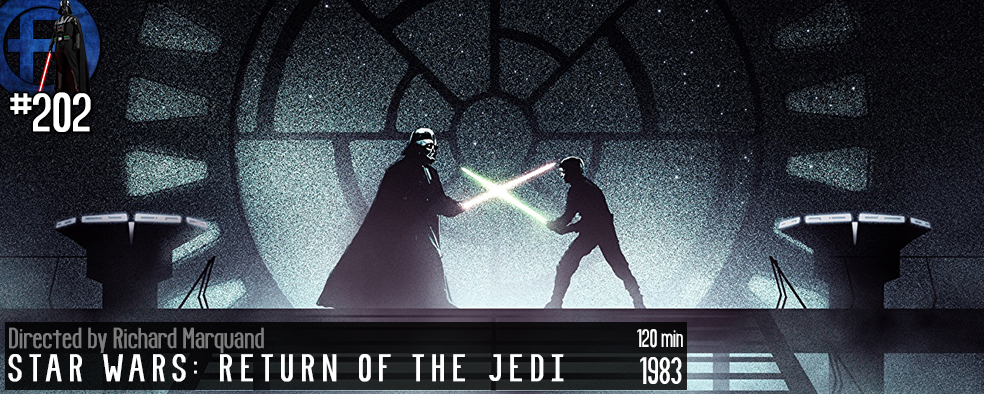
Cast : Mark Hamill, Harrison Ford, Carrie Fisher, Alec Guinness, Anthony Daniels, David Prowse, Ian McDiarmid, Billy Dee Williams, Warwick Davis, Kenny Baker, Peter Mayhew, James Earl Jones, Frank Oz, Denis Lawson, Kenneth Colley, Jeremy Bulloch, Caroline Blakiston.
Synopsis: Luke, Leia and Lando Calrissian journey to Tatooine to rescue the carbonite-encased Han Solo. Darth Vader, now escalating the Empire’s plans to build a new, more powerful Death Star, has to contend with the imminent arrival of Emperor Palpatine. When Luke confronts Vader, even though the dying Yoda recommends against it, he is confronted with a temptation that may just be too much for the young, inexperienced Jedi Knight.
*********
Somewhere, deep inside, we all love those Ewoks. Pesky little furballs they may be, they manage to worm their way into your hearts throughout the course of this film. Return Of The Jedi represents the climax of the Star Wars saga, the completion of a storyline begun in A New Hope, and expanded upon in the more recent prequel trilogy. While perhaps not a perfect film (after all, it will be almost impossible to understand if you haven’t seen either of the two previous films) Return is a completely frenetic, joyous and explosive conclusion to the massive saga we’ve been witnessing. Luke Skywalker finally confronts Darth Vader about his paternal claims. Han and Leia finally agree that yes, they both love each other and are okay with that. C3PO twiddles about a forest with little or no harm done, and Yoda, while perhaps not the most impressively scaled being in the universe, ensures his legendary status in mythology by up and dying on Luke is his final visit. Alec Guinness makes a last second cameo appearance, more of a token effort than anything else, really, and Vader and Palpatine have the mother of all disagreements. Yessiree, its the wrapping up of the series, and it’s going out with a bang. Nothing like good old explosions and last-gasp heroics to send the audience away with a heart murmur, right? Right.
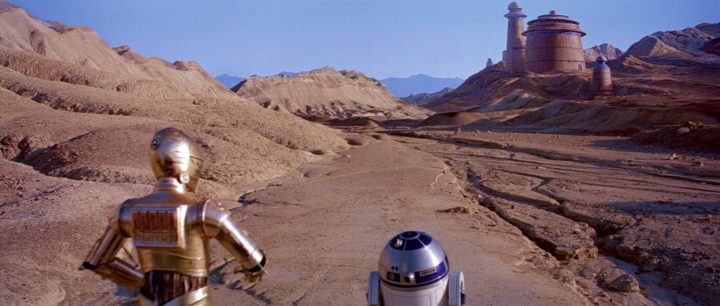
When we last left our heroes, Han Solo had been frozen in carbonite and taken to crime lord Jabba The Hutt, as payment of a debt. Leia and Luke had escaped to the safety of a spaceship, but not before Luke had his hand removed by Vader, and the all-important statement of paternal perogative bestowed upon him by the evil Sith Lord. Luke had learned much in his training with Yoda, who remained on Dagobah, awaiting the young Jedi Knight’s return. With Return, we open the film with droids R2D2 and C3PO arriving at the hideout of Jabba The Hutt, the violent, bloated worm-like kingpin of the Tatooine underworld. When they are both captured and sent into service for the vile gangster, C3PO becomes Jabba’s translator: after all, he is fluent in over six million forms of communication. Suddenly, a bounty hunter arrives, holding Chewbacca captive, and after a short moment of tension involving a thermal detonator (one might imagine is some sort of futuristic grenade…) the Wookie is imprisoned in Jabba’s cells, and the bounty hunter has a few drinks with several other lowlife scum inhabiting the establishment.
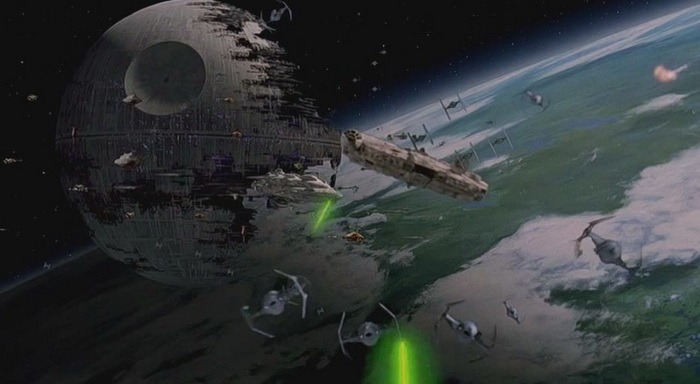
It’s then that Luke himself arrives, to bargain for Han’s life. Jabba, having none of this, plunges the young Jedi into a pit, to face off against the gigantic Rancor monster, a cross between King Kong, Gozilla, and some kind of squidgy, red beast known only to HP Lovecraft. In the process, Luke defeats the beast, and is then sentenced to die, alongside Han and Chewbacca, in the mouth of the Saarlac, a sand-dwelling monster who slowly digests his preyover hundreds of years. The bounty hunter, we also learn, is actually Leia in disguise, and she’s sprung trying to rescue Han herself. Her sentence, after discovery, is to wear a skimpy bikini (woot!) and become Jabba’s plaything. Okay, so Return Of The Jedi has a somewhat convoluted and complex opening sequence, and as much as it’s thrilling and filled with genuine humour and tension, it tends to bog the film down in a kind of hazy, dingy melodrama, before picking up to become the rollicking sci-fi escapade we signed on for by watching this film. Eventually, Han is indeed rescued, along with all the other cast involved in Jabba’s segment of the film. Then, it’s back to Dagobah for Luke, and the Rebellion’s headquarters for everybody else, where a last ditch convening of the alliance is forming to determine how they plan to defeat Vader and the Emperor for the final time.
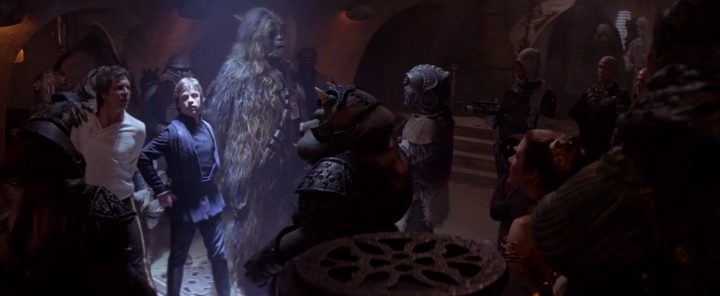
While Empire was the perfect antidote to the effusive brilliance of A New Hope, inasmuch as it generated some real tension in our heroes, as they ventured into some truly dark territory (narrative wise) and came out the other side not altogether in one piece, Return of the Jedi manages to recapture the imaginative, humorous and gleefully adventurous tone of the original film, as Han, Leia and the droids venture to the jungle planet of Endor to destroy a force field generator protecting the orbiting Death Star. While on Endor, they meet the Ewoks, a furry race of tiny dwarven creatures who are perhaps the planets natural inhabitants. Initially suspicious of humans, the Ewoks soon come to befriend out heroes, although not before trying to roast Han and Luke over an open fire. Luke, himself on a journey of discovery, has returned to visit Yoda, who we discover is close to death, imparting some final words of wisdom to the young Jedi. Luke decides that he must confront Vader, in order to discover the truth of the Sith Lord’s claims of being his father, and to try and convince him to return to the Good Side of the Force. In what appears to be a desperate move by the young man, Luke allows himself to be captured by the Imperial Forces on Endor, and is swiftly taken up to the Death Star to gain an audience with the Emperor and Vader.
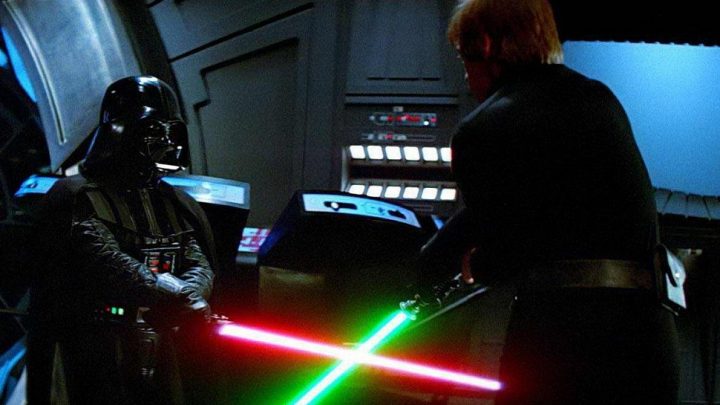
Shades of light and dark are needed to make any film a balanced, more productive affair thematically. Here, the light is primarily the storyline of the Ewoks and Han/Leia, who must defeat a legion of Imperial Stormtroopers on Endor to blow up the power generator protecting the Death Star from attack. A fleet of Rebellion ships arrives in orbit, to take on the Death Star, and it’s a race against time to lower the shield barrier so they can attack the deadly space station. Effectively the counterweight to the darker, more layered story of Luke and his moments with Vader and the Emperor, Endor and the Ewoks is a last blowout of effects, humour and action, all told with a sly, tongue-in-cheek familiarity we were used to in A New Hope. Above the planet, deep in the bowels of the Death Star (although, actually, the Emperor’s Throne Room where Luke is taken appears to be in a tall tower protruding from the Death Star’s surface… which only serves to add itself as a prime target for enemy fire, if you ask me!) the Emperor, Vader, and Luke, engage in a conversation that would no doubt have ramifications for the universe were Luke to cave into Palpatine’s temptations. The lure of the Dark Side is what awaits Luke, Vader almost apologising for his own inability to resist (which was touched upon in Revenge of The Sith years later) and a lightsabre battle beginning when the conflict escalates.
What I enjoyed about Return, particularly, was the way in which Lucas had Luke try and return Vader to the Good Side, to recant his evil ways and side with his own flesh. Yes, we can confirm that Vader, Anakin Skywalker, is really Luke’s father (which, if you watch the film series in order is a forgone conclusion…. again I question Lucas’ decision to film the prequels in any case) and he might just be able to be lured back to the side of happiness and dancing. Vader, struggling with his own inner demons, is tempted, but stoically resilient. Luke engages in battle with him, pummelling the Sith Lord into submission through pure rage and the belief that the Emperor will pursue Luke’s sister Leia (that’s right, she’s his sister you dope! Didn’t you watch Revenge Of The Sith?) in Luke’s place should he refuse the offer of joining the Dark Side. The music swells, the crescendo is reached, and a decision is made one way or the other. If you think about it, it’s the logical one, but there’s a moment, only the barest of moments, when you start to wonder if Luke will indeed simply join his father at the right hand of the Emperor.
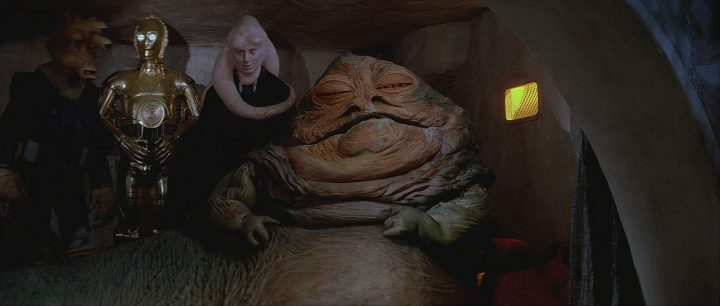
The film bounds from one story thread to another, building up to a dramatic, exciting climax with the Millennium Falcom, flown by Lando, and accompanied by Star Wars regular Wedge in an X-Wing, flying into the Death Star to blow up the central reactor, parallel to Luke’s battle with Vader and the Emperor, and Han and Leia’s efforts on the surface of Endor. It barely pauses for breath, but when it does, is quite sublime. In between the bombast and hyperbolic action sequences, we get tender moments of intimacy, mainly between Luke and fellow cast members, such as Yoda and Leia. With Yoda, Luke is a seething ball of questions and outrage: Yoda did not tell him Vader was his father, and he feels betrayed by that. After all, Yoda (and Obi-Wan) knew Vader was Anakin Skywalker, and they seemed to betray that trust by allowing him to confront Vader without this knowledge. Yodas culpability in this has often been a sticking point for me: I understand Obi-Wan’s initial reluctance to inform Luke of the fact, since it would appear at the appropriate time that Luke would be unable to handle it without going off the deep end. But Yoda, a far more subtle character, with his innate kindness and Jedi-instinct, is aware that this terrible secret cannot possibly hope to survive unless he passes it on, and the only person to whom he can give it, is Luke himself.
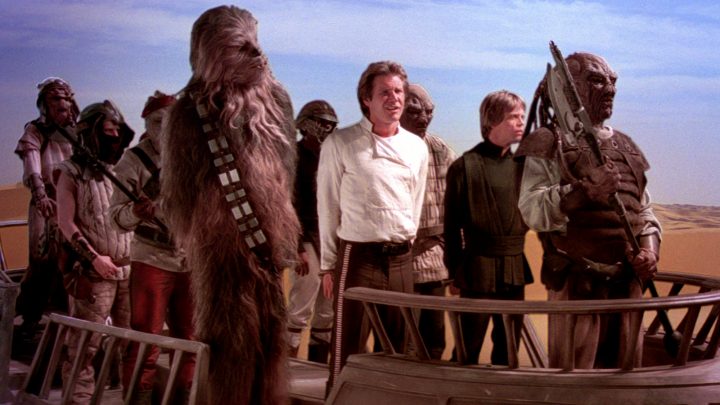
There is also a wonderful moment of revelation between Luke and Leia, as their family lineage is revealed to her for the first time. Shot in the treetops of Endor, the blue/green hues playing wonderfully in the background as Luke unveils his secret to her, this is a moment of profound sadness for Leia, and a moment of exquisite emotion for both: in the context of the Star Wars saga, it’s perhaps as big a moment as Luke being told he’s Vaders father, and perhaps as big as Anakin finally putting on the suit for the first time. As a sidenote, I often wonder why Leia never freaked out when she discovered that Vader is her father too. After all, her biggest emotional moment comes when Luke imparts that he’s her brother, but when he mentions that Vader is his father (and consequently, hers too) she barely bat’s an eyelid. It’s a small thing, I know, but perhaps a gaggle-eyed gulp of “holy crap” might have been appropriate.
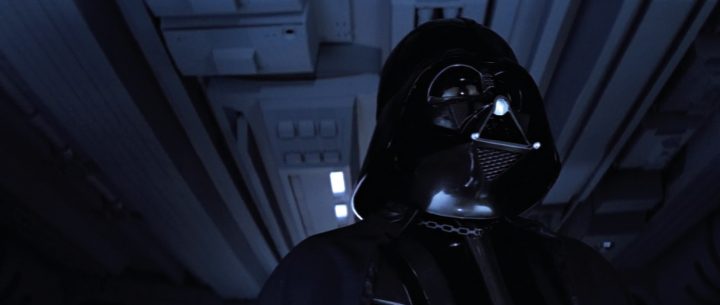
The main issue I have with Return is that the emotional beats are simply too few, and too far, between. Structurally, the film is exactly the way it should be in terms of wrapping up the whole saga: the destruction of the Empire, the return of peace to the Galaxy, and the return of the Jedi as a force in the universe. Well, kinda. The action is extended, beautifully shot and edited, and often, really clever. The jaw dropping moment for me, and a moment in the film that to this day I cannot figure out how they did, involves the Millennium Falcon flying into the Death Star and down through a twisting, labyrinthine wormhole into the very core of the space-station. Knowing that the Falcon and it’s accompanying Rebel ships are all models, only makes this effect, done before CGI, so cool. I will unabashedly admit to Return being my favourite of all the Star Wars films, certainly not because it’s the most well structured or most emotionally powerful (it’s not), but for the sheer fun of filmmaking, this film beats almost all comers. It’s like Lucas has said ” Okay boys, I’ve done all the heavy emotional stuff, and now I’m going to cut loose.” Cutting loose is something he does very well here. Marquand, to his credit, has a keen eye for the action and detail in the film, and a sense of style he brings to the movie is really classical. The scenes in the Emperors Throne Room resound with the almost-Royal tendencies, the near papal reverence with which he treats these moments and characters elevates their emotional status beyond what I think Lucas himself might have been capable of. Instead of being in the presence of merely the most evil ruler in the Universe, we’re given front row seats to a biblical clash of wills, the consequences thereof will resound throughout the Galaxy for generations.
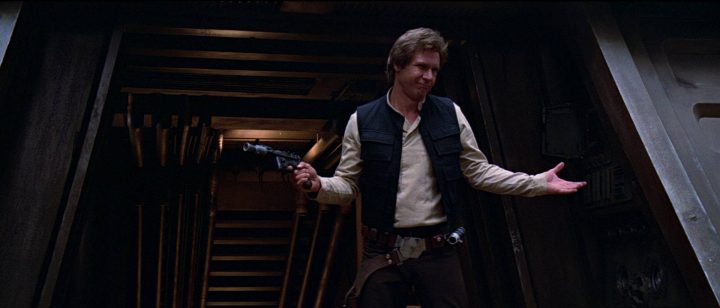
Return of the Jedi is a complex beast: on the surface, it’s nothing more than a simple action/adventure story, told with plenty of dazzling special effects. Beneath that, though, is an emotional core built up by two equally exceptional films in A New Hope and The Empire Strikes Back, that, while perhaps bloated by the Ewokian fuzziness of it all, still remains as true to Lucas’ original vision as ever. If you’re looking for a staggeringly mounted escapist entertainment masterpiece, then I dare you to walk past Return Of The Jedi and not take a peek in on the excitement.
